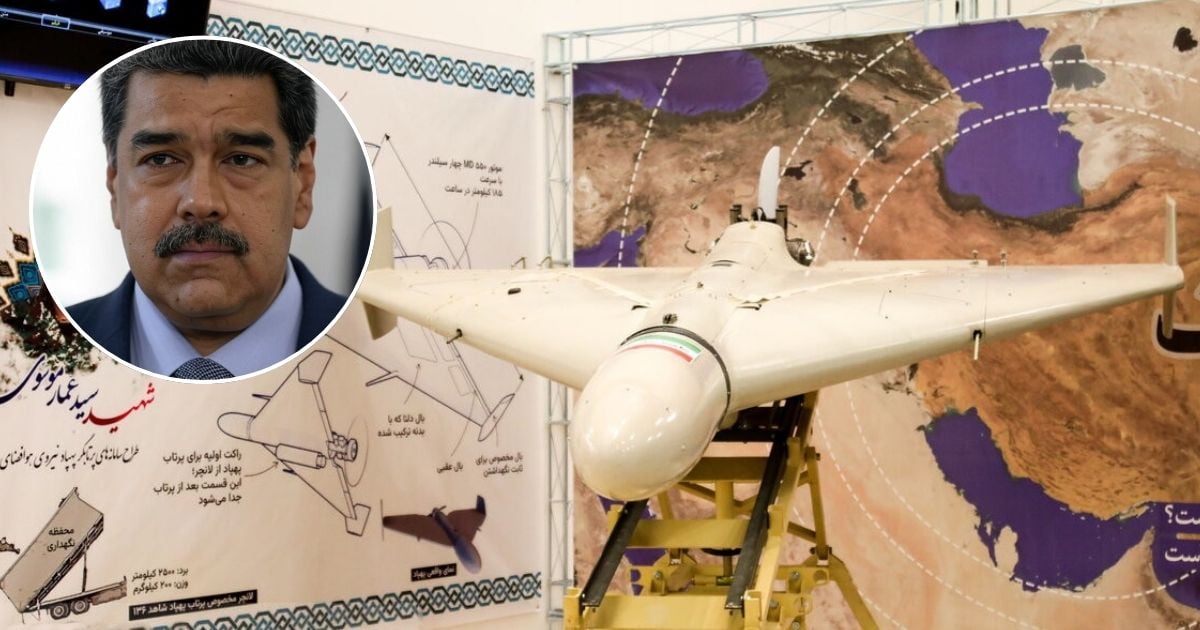
Related videos:
The regime of Nicolás Maduro has decided to advance in the manufacture of military drones in Venezuela, an initiative that has raised concerns in the international arena due to its implications for regional security. In collaboration with Iran, the Venezuelan government has established factories for the production of these unmanned aerial vehicles, which are used as versatile and potentially lethal military tools.
According to an intelligence report accessed by Infobae, the airline Conviasa has been involved in the transportation of drones and their components, such as the mobile control station and the equipment necessary for the operation of these aircraft. These developments are part of an effort to strengthen the internal repressive apparatus of the Venezuelan regime, as well as its military projection capabilities in the region.
The American senator Marco Rubio has expressed his concern over the growing influence of Iran and other international actors in Venezuela. During his confirmation hearing as Secretary of State, he stated that Maduro's regime is akin to a drug trafficking organization that controls the Venezuelan state. Rubio has warned that the construction of drone factories by Iran poses a direct risk to hemispheric security.
The drones developed in Venezuela, with Iranian technology and assistance, reflect a strengthening of the regime's strategic alliances with countries such as Russia, China, and Iran. It has been noted that these aircraft, like the Mohajer-2 system, known locally as ANSU-100, are being modernized and equipped with sophisticated weaponry at the El Libertador airbase in Aragua.
This drone project is not new. In 2009, Venezuela signed an agreement with Iran for the production of UAVs, which were assembled by the Venezuelan Military Industries Anonymous Company (CAVIM). Despite economic issues and international sanctions, the regime has remained committed to developing this technology, even showcasing one of the models publicly in 2012. However, the initial project faced setbacks due to funding and maintenance problems, which led to a temporary halt.
The recent reactivation of drone production in Venezuela is being carried out under the supervision of the National Aeronautical Company (EANSA). Maduro has promoted the production of these vehicles as a multifunctional tool, although the primary focus has been military use. These actions are part of a strategy by the regime to remain in power through repression and military control in an environment of increasing internal tension and international isolation.
The collaboration with Iran is particularly concerning as drones have become a key component in the military and terrorist strategy of the Iranian government. This cooperation would strengthen Venezuela's capacity to carry out military and repressive operations, thereby increasing instability in the region.
On the other hand, the Ukrainian president, Volodimir Zelenski, has denounced the presence of mercenaries from the Russian group Wagner in Venezuela, who would be collaborating with Maduro's forces to suppress citizen protests. Zelenski condemned this intervention, emphasizing that the Wagner group, known for causing destabilization, represents a direct interference of Russia in Venezuelan affairs, repeating a pattern of chaos and death. This information is relevant in the context of the accusations about the Wagner group and its impact on Venezuela.
The situation in Venezuela continues to deteriorate, with millions of people leaving the country due to the economic and political crisis. The international community is closely monitoring the actions of Maduro's regime, particularly with the new power dynamics involving external actors such as Iran and Russia. The production of drones could become a destabilizing factor, not only for Venezuela but for the entire continent.
Frequently Asked Questions about the Maduro-Iran Alliance and Drone Production in Venezuela
Why is the alliance between the Maduro regime and Iran in drone production a cause for concern?
The alliance between Maduro's regime and Iran for the production of military drones in Venezuela is concerning to the international community due to its implications for regional security. Collaboration with Iran, a country that has utilized drones in military and terrorist strategies, could enhance Venezuela's capacity to carry out military and repressive operations, further destabilizing the region.
What role does Conviasa play in the development of drones in Venezuela?
The airline Conviasa has been involved in the transport of drones and their components, such as the mobile control station and the equipment necessary for the operation of these aircraft, thus facilitating the production of drones in collaboration with Iran.
What are the political implications of drone production in Venezuela?
The production of drones in Venezuela, backed by Iran, represents a strengthening of the chavista regime's strategic alliances with countries such as Russia, China, and Iran. This not only expands its internal repressive apparatus but also reinforces its military projection capability in the region, which could increase instability on the continent and internal repression.
How has the international community responded to the Venezuela-Iran alliance?
The international community, especially figures like U.S. Senator Marco Rubio, has expressed concern over Iran's growing influence in Venezuela. Rubio has pointed out that the establishment of drone factories poses a direct risk to hemisphere security, urging a reevaluation of current strategies and strengthening measures against Maduro's regime.
What drone models is Venezuela developing with the help of Iran?
Venezuela is developing drones with Iranian technology, such as the Mohajer-2, locally known as ANSU-100. These drones are being modernized and equipped with sophisticated weaponry at the El Libertador Air Base in Aragua, reflecting the Maduro regime's commitment to the development of advanced military capabilities.
Filed under: